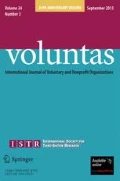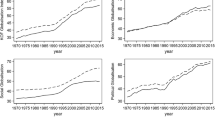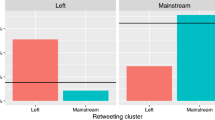Abstract
This study offers a first empirical test at a truly global level of two contradictory models of global civil society in the global governance system that are put forth by neo-Gramscian thought. The first model posits that global civil society is coopted by hegemonic capitalist and political elites, and promotes hegemonic interests by distributing neoliberal values and providing a façade of opposition. The second model views global civil society as the infrastructure from which counter-hegemonic resistance, and ultimately a counter-hegemonic historic bloc will evolve and challenge neoliberal hegemony. The predictions that these two views make as to the structure of global civil society networks are tested through network analysis of a matrix of links between 10,001 international NGOs in a purposive sample of INGOs extracted from the database of the Union of International Associations. The findings provide partial support to the predictions of both models, and lead to the conclusion that at present global civil society is in a transitional phase, but that the current infrastructure provided by the global INGOs network is conducive to the development of a counter-hegemonic historic bloc in the future, providing the northern bias in network is decreased. Strategic steps needed to achieve this are presented.



Similar content being viewed by others
References
Amoore, L., Dodgson, R., Gills, B. K., Langley, P., Marshall, D., & Watson, I. (2000). Overturning globalization: Resisting teleology, reclaiming politics. In B. K. Gills (Ed.), Globalization and the politics of resistance (pp. 12–28). London: Macmillan.
Anheier, H. K., & Katz, H. (2003). Mapping global civil society. In M. Kaldor, H. Anheier, & M. Glasius (Eds.), Global civil society 2003 (pp. 241–258). Oxford: Oxford University Press.
ASAE (2005). The international journey: Different paths to take. American Society for Association Executives.
Batliwala, S. (2002). Grassroots movements as transnational actors: Implications for global civil society. Voluntas, 13, 393–409.
Bigman, D. (2002). The pros and cons of globalization for developing countries. In D. Bigman (Ed.), Globalization and the developing countries: Emerging strategies for rural development and poverty alleviation (pp. 27–79). The Hague: CABI Publishing in association with ISNAR.
Bocock, R. (1986). Hegemony. London: Tavistock Publications.
Boli, J., & Thomas, G. M. (1997). World culture in the world polity: A century of international non-governmental organization. Annual Sociological Review, 62, 171–190.
Borgatti, S. P., & Everett, M. G. (1999). Models of core–periphery structures. Social Networks, 21, 375–395.
Borgatti, S. P., Everett, M. G., & Freeman, L. C. (2002). UCINet for Windows: Software for social network analysis. Harvard, MA: Analytic Technologies.
Carroll, W. K. (1992). Social movements and counter-hegemony: Canadian contexts and social theories. In W. K. Carroll (Ed.), Organizing dissent: Contemporary social movements in theory and practice: Studies in the politics of counter-hegemony (pp. 3–38). Toronto: Garamond Press.
Carroll, W. K., & Carson, C. (2003). The network of global corporations and elite policy groups: A structure for transnational capitalist class formation? Global Networks, 3, 29–57.
Castells, M. (1989). The informational city: Information technology, economic restructuring, and the urban-regional process. Oxford: Blackwell.
Castells, M. (1997). The power of identity. Malden, MA: Blackwell.
Cock, J. (2004). The World Social Forum and new forms of social activism. In R. Taylor (Ed.), Creating a better world: Interpreting global civil society (pp. 170–183). Bloomfield, CT: Kumarian Press.
Cox, R. W. (1993). Gramsci, hegemony and international relations. In S. Gill (Ed.), Gramsci, historical materialism and International Relations (pp. 49–66). Cambridge: Cambridge University Press.
Cox, R. W. (1996). Approaches to world order. Cambridge: Cambridge University Press.
Cox, R. W. (2002). The political economy of a plural world: Globalization and civilization. New York: Routledge.
Diani, M. (2003). Leaders or brokers: Positions and influence in social movement networks. In M. Diani & D. McAdam (Eds.), Social movements and networks: Relational approaches to collective action (pp. 105–122). Oxford: Oxford University Press.
Dicken, P. (1998). Global shift: Transforming the world economy. New York: Guilford Press.
Edwards, M. (1999). International development NGOs: Agents of foreign aid or vehicles for international cooperation? Nonprofit and Voluntary Sector Quarterly, 28, 25–37.
Esping-Andersen, G. (1996). After the golden age? Welfare state dilemmas in a global economy. In G. Esping-Andersen (Ed.), Welfare states in transition: National adaptation in global economies (pp. 1–31). London: Sage.
ESRI [Environmental Systems Research Institute] (2005). ArcGIS desktop. Redlands, CA: Environmental Systems Research Institute.
Falk, R. (2000). Resisting globalization from above through globalization from below. In B. K. Gills (Ed.), Globalization and the politics of resistance (pp. 46–56). London: Macmillan.
Falk, R. (2003). On the political relevance of global civil society. In J. H. Dunning (Ed.), Making globalization good: The moral challenges of global capitalism (pp. 280–300). Oxford: Oxford University Press.
Florini, A., & Simmons, P. J. (2000). What the world needs now? In A. Florini (Ed.), The third force: The rise of transnational civil society (pp. 1–16). Tokyo, Washington DC: Japan Center for International Exchange, Washington Carnegie Endowment for International Peace.
Forgacs, D. (1988). An Antonio Gramsci reader: Selected writings, 1916–1935. New York: Schocken Books.
Gills, B. K. (2000). Introduction: Globalization and the politics of resistance. In B. K. Gills (Ed.), Globalization and the politics of resistance (pp. 3–11). London: Macmillan.
Gramsci, A. (1971). Selections from the prison notebooks of Antonio Gramsci. London: Lawrence & Wishart.
Kaldor, M. (2001). A decade of humanitarian intervention: The role of global civil society. In H. Anheier, M. Glasius, & M. Kaldor (Eds.), Global civil society 2001 (pp. 109–143). Oxford: Oxford University Press.
Kaldor, M., Anheier, H., & Glasius, M. (2003). Global civil society in an era of regressive globalization. In M. Kaldor, H. Anheier, & M. Glasius (Eds.), Global civil society 2003 (pp. 3–33). Oxford: Oxford University Press.
Katz, H., & Anheier, H. (2005). Global connectedness: The structure of transnational NGO networks. In H. Anheier, M. Kaldor, & M. Glasius (Eds.), Global civil society, 2005/6. London: Sage.
Keck, M., & Sikkink, K. (1998). Activists beyond borders: Trasnational activists in international politics. Ithaca, NY: Cornell University Press.
Khagram, S. (2002). Restructuring the global politics of development: The case of India’s Narmada valley dams. In S. Khagram, J. V. Riker, & K. Sikkink (Eds.), Restructuring world politics: Transnational social movements, networks, and norms (pp. 206–230). Minneapolis: University of Minnesota Press.
Koenig, B. L. (2004). Going global for the greater good: Succeeding as a nonprofit in the global community. San Francisco: Jossey-Bass.
Maher, J. (Ed.) (2001). Europa world year book 2001 (Vols. I & II). Europa Publications.
McGrath, C., & Krackhardt, D. (2003). Network conditions for organizational change. The Journal of Applied Behavioral Science, 39, 324–336.
Moen, D. G. (1998). Analysis of social transformative movements in advanced capitalism: A neo-Gramscian approach. Journal of Policy and Culture, 3, 117–133.
Munck, R. (2004). Global civil society: Myths and prospects. In R. Taylor (Ed.), Creating a better world: Interpreting global civil society (pp. 13–26). Bloomfeld, CT: Kumarian Press.
Persaud, R. B. (2001). Counter-hegemony and foreign policy: The dialectics of marginalized and global forces in Jamaica. New York: State University of New York Press.
Pollin, R. (2000). Globalization, inequality and financial instability: Confronting the Marx, Keynes and Polanyi problems in the advanced capitalist economies. Working Paper No. 8, University of Massachusetts, Political Economy Research Institute, Amherst, MA.
Ramia, G. (2000). Global social policy, INGOs and strategic management: An emerging research agenda. Global Social Policy, 3, 79—101.
Ratner, R. S. (1992). New movements, new theory, new possibilities? Reflections on counter-hegemony today. In W. K. Carroll (Ed.), Organizing dissent: Contemporary social movements in theory and practice: Studies in the politics of counter-hegemony (pp. 234–242). Toronto: Garamond Press.
Rupert, M. (1993). Alienation, capitalism and the inter-state system. In S. Gill (Ed.), Gramsci, historical materialism and international relations (pp. 67–92). Cambridge: Cambridge University Press.
Salamon, L. M., & Anheier, H. K. (1992). In search of the nonprofit sector II: The problem of classification. Voluntas, 3, 267–309.
Salm, J. (1999). Coping with globalization: A profile of the northern NGO sector. Nonprofit and Voluntary Sector Quarterly, 28, 87–103.
Sassoon, A. S. (1982). Hegemony, war of position, and political intervention. In A. S. Sassoon (Ed.), Approaches to Gramsci (pp. 94–115). London: Writers and Readers.
Snijders, T. A. B., & Borgatti, S. P. (1999). Non-parametric standard errors and tests for network statistics. Connections, 22, 61–70.
Taylor, P. J., Watts, M., & Johnston, R. J. (2002). Geography/Globalization. In R. J. Johnston, P. J. Taylor, & M. Watts (Eds.), Geographies of global change: Remapping the world (pp. 1–18). Malden, MA: Blackwell.
Taylor, R. (Ed.) (2004). Creating a better world: Interpreting global civil society. Bloomfield, CT: Kumarian Press.
Tickell, A., & Peck, J. A. (2003). Making global rules: Globalization or neoliberalization? In J. A. Peck & H-W. C. Yeung (Eds.), Remaking the global economy: Economic-geographical perspectives (pp. 163–181). London: Sage.
Tvedt, T. (2004). Development NGOs: Actors in a global civil society or in a new international social system? In R. Taylor (Ed.), Creating a better world: Interpreting global civil society (pp. 133–146). Bloomfeld, CT: Kumarian Press.
Ulvila, M., & Hossain, F. (2002). Development NGOs and political participation of the poor in Bangladesh and Nepal. Voluntas, 13, 149–163.
WSF [World Social Forum] (2004). Programme: WSF organised. Mumbai: World Social Forum.
Acknowledgments
Thanks are due to Helmut Anheier, Phillip Bonacich, Leo Estrada, Zeke Hasenfeld, and Stuart Kirk, for their guidance on this research, and to Jan De Leew for help in performing the correspondence analysis.
Author information
Authors and Affiliations
Corresponding author
Rights and permissions
About this article
Cite this article
Katz, H. Gramsci, Hegemony, and Global Civil Society Networks. Voluntas 17, 332–347 (2006). https://doi.org/10.1007/s11266-006-9022-4
Published:
Issue Date:
DOI: https://doi.org/10.1007/s11266-006-9022-4




